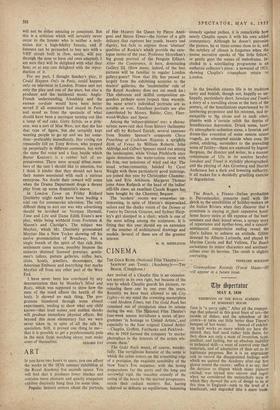CINEMA
THE GOLD RUSH. (National Film Theatre.)— SAWDUST AND TINSEL. (Academy.)—Tin. BEACH. (Cinephone.) ANY revival of a Chaplin film is an occasion not merely in its own right, but because of the way in which Chaplin guards his pictures, re- releasing them one by one over the, years. Recently we have been allowed to see City Lights—to my mind the crowning masterpiece —and Modern Times, but The Gold Rush has remained out of circulation since its reissue during the war. The National Film Theatre's four-week season introduces a series of pro grammes 'in homage to United Artists,', and especially 'to the four original United Artist, —Chaplin, Griffith, Fairbanks and Pickford- who in 1919 formed the company 'to market photoplays in the interests of the artists wht create them.'
The Gold Rush wears, of course, wonder. fully. The vertiginous humour of the, scene in which the cabin totters on the crumbling edge of a precipice, the exquisite sensibility of the New Year's Eve sequence, with the loving preparations for the party and the long and sorrowful vigil, the macabre comedy of the eating of the boots by the starved prospectors. retain their radiant mastery. But, having achieved so delicate an equilibrium, balancing
comedy against pathos, it is remarkable how nearly Chaplin upsets it with his own added commentary. Although he doesn't patronise the picture, he at times comes close to it; and the subtlety of silence is forgotten when the jocose narrative speaks of 'the little fellow,' or gently guys the scenes of melodrama. In- cluded in a scintillating programme is an authentic collector's piece: a newsreel of 1921. showing Chaplin's triumphant return to London.
In the Swedish cinema life is by tradition nasty and brutish, though not, happily or un- happily, particularly short. Sawdust and Tinsel. a story of a travelling circus at the turn of the century, of the humiliations experienced by its lumbering proprietor and his mistress, tied in• escapably to the circus and to each other, plumbs with a certain relish the depths of Scandinavian depression. Drunk scene, heay• ily atmospheric seduction scene, a feverish and dream-like evocation of some remote minor tragedy, an attempted suicide when even the pistol, misfiring, surrenders to the prevailing sense of futility—these are explored by Ingmar Bergman, the director and writer, in a manner reminiscent of Ufa in its sombre heyday. Sawdust and Tinsel is stylishly photographed, and the playing of Ake Gronberg and Harriet Andcrsson has a dark and lowering authority. It all makes for a decidedly gruelling exercise in degradation.
The Beach, a Franco - Italian production in Ferraniacolor, concerns itself with the shock to the sensibilities of holiday-makers on the Italian Riviera when they discover that a prostitute is staying at their expensive hotel. Some heavy satire at the expense of the busi- nessmen and their bored wives, a syrupy story of repentance and mother-love, and a cynical- sentimental comprdmise ending reveal the film's failure to achieve an attitude. Glibly directed by Alberto Lattuada, and played by Martine Carole and Raf Vallone, The Beach caricatures its minor characters and sentimen• talises over its heroine. The result is slightly enervating.
PENELOPE HOUSTON
• Gramophone Records (Vocal Music—!!) will appear in a future issue.










































 Previous page
Previous page